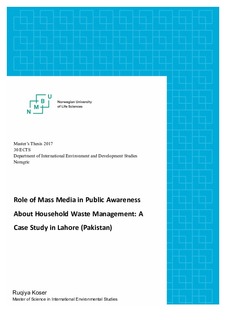| dc.contributor.advisor | Molteberg, Elisabeth | |
| dc.contributor.author | Koser, Ruqiya | |
| dc.coverage.spatial | Pakistan, Lahore | nb_NO |
| dc.date.accessioned | 2017-11-10T14:05:22Z | |
| dc.date.available | 2017-11-10T14:05:22Z | |
| dc.date.issued | 2017 | |
| dc.identifier.uri | http://hdl.handle.net/11250/2465595 | |
| dc.description.abstract | Household waste management is both an urban or rural problem. Everyone is a potential generator of this waste and also a contributor of this problem. Due to urbanization and increasing population of Lahore Pakistan, the management of household waste has become major challenge for the Government of Lahore. Improper services for handling waste and the lack of awareness among people about the hazardous effect of this waste make the problem even worse. Mass media plays a vital role for the awareness of household waste management among individuals. Probably, the more informed the individual is about hazardous effect of unsorted waste, more active he/she is to manage the waste properly and to follow the policies made for the protection of environment. Therefore, it is crucial to investigate the role of mass media in public awareness about household waste management in Lahore, Pakistan. The main focus was to investigate the understanding and awareness of individuals of two different areas (Shahdara and DHA) about household waste management. A theoretical framework was developed focusing on agenda setting theory and knowledge gap theory to understand the media role on the awareness of household waste management and how the participants of both areas perceive mass media information and how that information effects the attitudes and practices of people belonging to two different socio-economic statuses.
The study used qualitative research methodology through which in depth interviews were conducted with the participants of two areas and also with the journalists by using mix criterion or convenience sampling approach.
The findings of the research demonstrated that overall reporting about household waste management is not proper in Pakistan. Only few environmental journalists in the country are assigned the task of reporting household waste management issue that too only on special occasions. In addition, if the information about household waste management is selected for publication and broadcasting, it got very little space and attention due to the organizational agenda. It was also observed that the awareness level of participants from two areas was mostly dependent on their economic conditions and educational level and the services which they have. | nb_NO |
| dc.language.iso | eng | nb_NO |
| dc.publisher | Norwegian University of Life Sciences, Ås | nb_NO |
| dc.rights | Attribution-NonCommercial-NoDerivatives 4.0 Internasjonal | * |
| dc.rights.uri | http://creativecommons.org/licenses/by-nc-nd/4.0/deed.no | * |
| dc.subject | Environment | nb_NO |
| dc.subject | Journalists | nb_NO |
| dc.subject | Socio-economic status | nb_NO |
| dc.title | Role of mass media in public awareness about household waste management : a case study in Lahore (Pakistan) | nb_NO |
| dc.type | Master thesis | nb_NO |
| dc.description.version | submittedVersion | nb_NO |
| dc.source.pagenumber | 52 | nb_NO |
| dc.description.localcode | M-IES | nb_NO |

